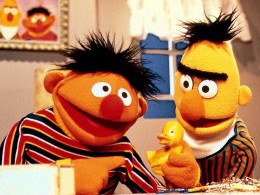Is Everything Awesome? On Money and Optimism

It can be hard to strike the right emotional balance when thinking about something as fraught as money. Too optimistic and you’re joyriding without a seat belt, assuming ditches are for other people. Too pessimistic and you’re Choire. When financial safety is at stake, it probably pays to be more pessimistic than otherwise, because then you’ll be more careful, right? More ant than grasshopper. More Bert than Ernie.
The trouble is, being pessimistic is so depressing. You can end up crying in the office, leading to tart emails from HR, like in this spot-on Onion article.
In an effort to ensure employees stay focused during business hours, Paragon Media human resources director Patty Clemence sent a company-wide email Tuesday reiterating that any crying done at the office must be work-related, sources confirmed. “All personal crying, such as that stemming from household finances or fights with your spouse, should either be taken care of before you arrive at work in the morning or be put off until after 5 p.m.,” said Clemence, asking that workers limit openly weeping at their desk or in a bathroom stall to job-oriented topics such as benefits, their workload, or a lack of appreciation among colleagues.
Or you end up writing boner-killers like this one for Alternet:
Lots of people are cheering that the U.S. economy has shown signs of strengthening. The stock market looks to be doing better than anyone expected, and unemployment is under 6 percent. But are things really as good as they seem? We are a bit skeptical. Let’s take a look at some signs that things are not altogether well in the American economy.
Oh my god! The reason people are cheering, if anyone is, is that it’s been such a long grim slog through recession and recovery. Can you not let us breathe for a second before clamping us back into the corset of anxiety?
Perhaps not coincidentally, Alternet is the site that brought us the memorable “14 Habits of Highly Miserable People.” And the #1 habit on that list?
1. Be afraid, be very afraid, of economic loss. In hard economic times, many people are afraid of losing their jobs or savings. The art of messing up your life consists of indulging these fears, even when there’s little risk that you’ll actually suffer such losses. Concentrate on this fear, make it a priority in your life, moan continuously that you could go broke any day now, and complain about how much everything costs, particularly if someone else is buying. Try to initiate quarrels about other people’s feckless, spendthrift ways, and suggest that the recession has resulted from irresponsible fiscal behavior like theirs.
At least they’re consistent.
There are benefits to optimism, though! It stands to reason that optimistic people take more risks, try more new and different things; maybe they’re more resilient, too, when experiments don’t work out right away. In other words, as Gallup puts it, optimism pays. And we can learn to incorporate more Ernie (and less Alternet) into our points of view:
optimism isn’t necessarily innate. Unlike many personality traits and talents, optimism is one of the few emotions that people can acquire. “While some leaders are naturally inclined to be optimistic,” says Greenberg, “others can learn to be more optimistic by understanding their leadership style and changing their behavior.”
Support The Billfold
The Billfold continues to exist thanks to support from our readers. Help us continue to do our work by making a monthly pledge on Patreon or a one-time-only contribution through PayPal.
Comments